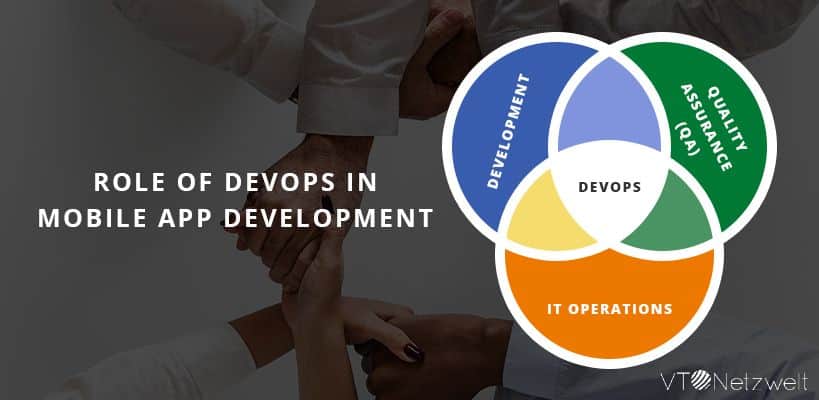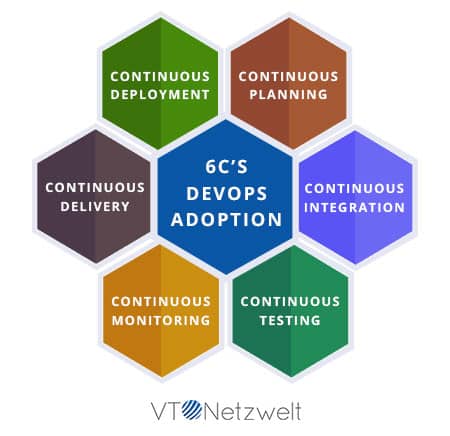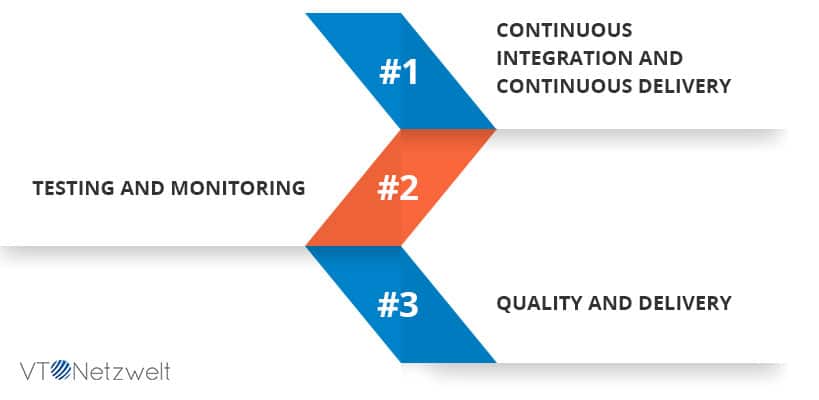Summary of the Article
Have a project in mind?
Schedule a CallRole of DevOps in Mobile App Development
Summary of the Article
Over the past 5 years, Android and iOS devices have become the primary source of accessing the internet for millions of people around the globe. These trends have scrambled many industries to adapt to the shift in business application users by developing a mobile app for their business application.
During the early years of this shift, IT industry focused on meeting the market demand and businesses focused on creating a market presence and they overlooked to focus on app development due to costs, security, maintainability, code quality, etc.
Presently as the underlying surge has settled down, it’s a great opportunity to focus on these issues and embrace new methodologies to lessen cost and increase quality. It is high time for companies to embrace the mobile-first approach and focus on building their business application for both iOS and Android ecosystem.
You can hire a freelancer or in-house resource or a mobile app development company offering both Android app development services and iOS app development services.
In this blog, we will be discussing the DevOps approach in Mobile App Development, the major challenges faced, and best practices to overcome those challenges.
What is DevOps?
DevOps is a modern software engineering approach which focuses on effective collaboration between project managers, developers, operations staff while aligning with enterprise business objectives.
The conventional techniques utilized before DevOps approach lacked powerful coordinated effort between various departments of Software Development which eventually lead to additional time in development, more holes in customer pocket, and results in customer dissatisfaction.
Benefits of Adopting DevOps
DevOps has brought the development and operations team on the same page. Before DevOps, developers used to write the complete code and then convey it to the operations team. With DevOps process, responsibilities are distributed equally among different teams with a single goal that each team has clear visibility of application performance.
Adopting DevOps in your Enterprise offers –
- Continuous Software Delivery
- Enhanced Customer Experience
- Faster Resolution of Bug Fixes/Problems
- Higher Employee Engagement
- Faster Delivery of the Product
- More Stable Environment for Easy Deployments
- More Time for Innovation
- Increased Efficiency
6C’s of DevOps Adoption
-
Continuous Planning
Continuous Planning refers to bringing your entire team like the developers, business analyst, testers, and operations team on the common platform to determine the scope of the application in the preparation of a release plan.
-
Continuous Integration
Continuous Integration (CI) address the developers community by focusing on error-free builds following the best practices and standards of the version control.
-
Continuous Testing
Testing is an important part of Software Development Lifecycle. Testing ensures the quality of the product delivered to the customer. Continuous Testing in DevOps emphasis on automation of all the phases of Software Testing.
-
Continuous Monitoring
Continuous Monitoring ensures that the application is performing as desired and the production environment is kept stable no matter the frequency of changes without any human interaction.
-
Continuous Delivery
Continuous Delivery is the practice that ensures that the code is deployed to the production environment by delivering every change to a production-like environment.
-
Continuous Deployment
Next step of Continuous Delivery is Continuous Deployment. Every change that passes the automated tests through Continuous Testing is deployed to the production environment automatically.
Mobile DevOps
Adopting DevOps in Mobile App Development can be a game-changer for many organizations. DevOps ensures that all different teams become more productive in terms of execution.
However, adopting DevOps is not an easy process as it requires a lot of technical and business decisions but once implemented successfully can bring value to the organization in terms of client satisfaction, increased efficiency, and increased revenue.
To adopt a continuous mobile DevOps workflow, all the bottlenecks and potential problems need to be identified at first.
Challenges in Adopting DevOps For Mobile App Development
While the basic principles of adopting DevOps for web apps and mobile apps are the same, still there are certain challenges for adopting DevOps in mobile app development. These challenges include –
-
Multi-Platform Support
Mobile applications have multiple target environment. Most of the mobile apps target multiple devices, OS versions, hardware specifications and more.
-
Apple App Store and Google Play Store
Generally, a mobile app cannot be deployed directly to a mobile device. It has to go through the App Store for iOS and Google Play Store for Android. The app goes through a submission and review process of the App Store.
-
Pull Deployment Model
Traditional deployments operate on a push model where a new version of the application can be pushed whether it is a web app or a cloud-based app. However, the process of updating a mobile app is a pull process as it is up to the user to choose whether or not he/she wants to update the app.
-
Mobile App Testing
Nothing is worse than a 1-star rating for your mobile app. Unsatisfied customers can publically harm your brand through the medium of the App Store or Play Store. So it becomes extremely important for you to do rigorous testing using functional, usability, and performance testing techniques for your app.
How to Adopt Mobile DevOps?
Adopting Mobile DevOps in your organization requires 3 thumb rules which need to be followed –
Rule #1 – Continuous Integration and Continuous Delivery
- The mobile app development team must ensure the traceability of all the development assets including code, configurations, scripts, documents, text files, etc. Continuous Integration must be practiced which ensures that the code delivered by one team works with the code delivered by the other team. Frequent builds must be done and new code must be integrated with the code previously developed.
- Android and iOS are completely dominating the mobile app landscape. Android and iOS are very much fragmented. There are different types of variants of Android for almost every brand and Apple has also branched iOS to support iPad. Due to the fragmentation, developers must maintain a separate build for each of the variants and platforms targeted.
- Mobile App Developers are acclimated to utilize an IDE to manually generate builds. Different builds are generated for different platforms manually. As the number of builds increase, developers can use scripts to generate automated builds. Developers can manage those scripts by assigning versions to it thereby ensuring that any build can be reproduced at any time.
Rule #2 – Testing and Monitoring
- Mobile App Development lags behind enterprise web apps in test automation. Most of the mobile app testing is done on simulators rather than on actual physical devices and testing on simulators is a completely manual process. Given the number of platforms and form factors, it is not even possible to do manual testing. The only possible way is to test your app is using automated testing tools.
- Every mobile app needs to interact with backend application and services. Mobile apps follow a rapid development process which results in more releases as compared to the backend application. This rapid development results in new features in the app which are not yet supported by the production environment. To solve this issue, the entire ecosystem can be made available on virtual instances. This results in rapid testing and also save hardware resources cost.
- It is a very common scenario that the app performs well in the test environment but fails in the live environment. There can be different factors associated with failure such as network conditions, memory, power, etc. So it becomes important for the developers to ensure continuous performance monitoring by adding third party SDKs to the app such as log, crash report, etc to find the root cause of the failure.
Rule #3 – Quality and Delivery
- The developers should closely monitor the feedbacks and ratings on App Stores for future enhancements and improvements which results in continuously improving mobile apps.
Advantages of using Mobile DevOps
-
Creation of better applications
User Experience is the most important factor nowadays. Mobile DevOps enables instant reporting and feedback, regression testing, transparent development process which results in faster troubleshooting of the errors, faster fixes, and optimized user experience.
-
Faster Release Time
DevOps increases the collaboration among the different departments and teams and simplifies the process of information sharing which results in faster code release.
-
Reduced Bottlenecks
DevOps ensures a transparent process, increases better communication among various teams, and helps in building better products. DevOps removes several bottlenecks including –
- Inconsistent development process
- Lack of ownership
- Manual testing process
- Instability in workflow
- Poor communication
Conclusion
DevOps has become the future of app development process whether it is a mobile app, web app, or server-based app. It can help an organization in transforming their development process resulting in a faster release of the products.
Seamless integration between tools and processes can contribute to the overall operational success of the organization.
Mobile app development services for the mobile-first world
VT Netzwelt is one of the leading mobile app development company offering native app development and cross-platform app development solutions following industry-leading design thinking to Agile to DevOps to Continuous Delivery.
Android app development services
We offer leading-edge Android app development solutions leveraging the power of Android Studio, Kotlin to deliver Android apps for smartphones, tablets, Android Wear, and Android TV.
iOS app development services
Our team of iOS app developers helps startups and enterprises develop apps using Swift, Objective C keeping in mind the design and development guidelines of the Apple ecosystem.
React Native app development
We have highly skilled React Native app developers to develop visually stunning and highly functional React Native applications for both iOS and Android using a single code base.
Flutter app development
We are one of the early adopters of the Flutter and have already helped our clients in building next-generation mobile apps for iOS and Android ecosystem.













Thanks for sharing. A very nice article on mobile devops. The only real challenge is that apps hosted on app store or play store have a process to follow which results in slow updates.
Hi Alex, we are glad that you liked the article. We agree that App Stores slow the process of updates but other than that the whole development process with DevOps is great. Being a mobile app development company, we have recorded some great results by adopting DevOps strategy with our Mobile App Development team.
There are lot of CI tools available out. Which is the best tool to use?
Hi Stephen, there are a lot of different tools which you can try. The best tool is the one that your team finds suitable to work with. The different tools that you can try are Jenkins, Nevercode.io, TravisCI, Circle CI, and many more.